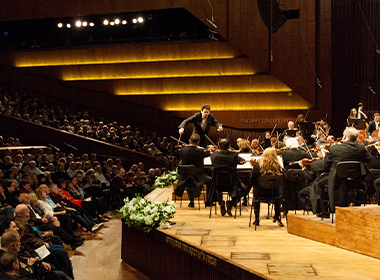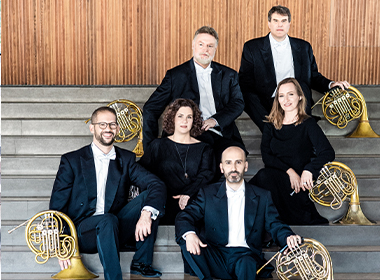Opening the Season with Beethoven’s Ninth and Sibelius’ Violin Concerto
The first concert of the season will feature three works, each expressing in its own way the search for peace and reconciliation.
The 2022-23 season will open with a program that, like the rest of the season, has everything. Beethoven’s Ninth, a masterpiece of classical symphonic writing; Sibelius’ late-romantic Violin Concerto, the peak of soloistic virtuosity; and the Israel Philharmonic premiere of a work by Arvo Pärt, one of the most revered contemporary composers. In Beethoven’s Symphony no. 9, Music Director Lahav Shani will be joined by the Bach Choir of Munich, the Gary Bertini Israeli Choir and a quartet of international vocal soloists. The demanding and stormy Violin Concerto of Sibelius will be performed by Sayaka Shoji, who enjoys a successful career as a soloist and chamber musician around the world. Arvo Pärt’s Swansong will offer a glimpse into the intriguing musical and spiritual world of one of the major composers of our time. Three composers, three different periods, and three masterpieces that seek peace and reconciliation within the stormy souls of their creators.
Beethoven – Symphony no. 9
Beethoven wrote his ninth and last symphony merely three years before his death. His mental and physical health had deteriorated, including a gradual loss of hearing, which, by this stage, was almost complete. Whether or not Beethoven knew that this was his last symphony, the Ninth is the culmination of his symphonic writing. Here he perfected and tightened the symphonic form, developed themes in a sophisticated way, and introduced innovations in orchestration and harmony. These musical characteristics, and the myth that surrounded Beethoven by the time of the symphony’s composition, make this work a milestone in western classical music. Beethoven’s most surprising innovation arrives in the fourth and most famous movement of the piece, when a choir and four soloists join the orchestra. Despite Beethoven’s somber personality and the great tragedy of his deafness, he concluded his last symphony with an optimistic declaration. He chose the poem “Ode to Joy” by the German poet Friedrich Schiller, calling for brotherhood and peace among all humanity. The utopian text, together with the grandiose and tremendous orchestration with choir and soloists, turn this last movement into a celebratory cantata that reflects Beethoven’s wish to find comfort and to leave the world a positive last testament. In 1985, the popular melody of the Finale was adopted by the European Union as its official anthem. Thus, the Ninth Symphony gained its eternal place in the canon of western music.
Sibelius – Violin Concerto
At the age of 15, after years of piano lessons, Jean Sibelius finally found his true love, the violin. His infatuation was instant, but came too late. Because Sibelius was unable to overcome the technical challenges of the violin or his debilitating stage fright, he quickly understood that his dream of becoming a virtuoso violinist would probably never materialize. Twenty years later, when Sibelius was already a celebrated composer in Finland, he expressed his unfulfilled love of the violin in his Violin Concerto, which has become one of the staples of the Romantic repertoire. Sibelius began writing the Concerto in 1902, after establishing himself as the leading Finnish composer with several hugely popular symphonic works. Despite his professional achievements, Sibelius’ personal life was stormy. He suffered bouts of depression and alcoholism, with devastating consequences for his finances, as well as for his wife and their three young children. Sibelius managed to complete his Violin Concerto despite external and internal interference, but the work was not perfect. It contained beautiful melodies that expressed the unique character of the violin, but also an overabundance of ideas that prevented the work from uniting into a persuasive and coherent whole. At the premiere, the audience responded favorably, but critics slayed the Concerto and Sibelius wanted to discard it. The person who saved the situation, and the Concerto, was Sibelius’ wife Aino, who decided to move the family from Helsinki to a quiet rural area, in the hope that this would grant her husband the peace and calm he so needed. Thus, in 1905 in his country home, far from the commotion and temptations of the city, Sibelius succeeded in rewriting the Concerto. He fulfilled his dream of composing a work that would showcase all the characteristics of the violin: brilliant virtuosity, sweeping lyricism and poignant intimacy. Jascha Heifetz’s recording from 1935 proved that this is indeed a masterpiece, and it became one of the best-loved Romantic pieces.
Arvo Pärt – Swansong
Swansong, in its Israel Philharmonic premiere, is the second version of a work originally written for organ and choir by Arvo Pärt. This orchestration was commissioned from Pärt by the Salzburg Festival in 2013, and quickly became more popular and frequently performed than the original version. The work was written by Pärt to commemorate 200 years to the birth of a very important person, probably unknown to the Israeli audience: John Henry Cardinal Newman, an intriguing 19th century English theologian. Cardinal Newman wished to bring Catholic liturgical traditions to the Anglican Church. In 1845 he converted to Catholicism, causing considerable controversy in church circles. Pärt based his work on one of Newman’s most famous sermons, Wisdom and Innocence, held in 1843 in the town of Littlemore. Over time, this short poetic text has become an independent prayer, used also in Anglican funeral liturgy. The prayer for “a safe lodging, and a holy rest, and peace at the last” has found a hymn-like expression in Pärt. Arvo Pärt’s writing fits Newman’s text like a glove: the use of infinite lines in the musical architecture, the unique tonality that combines Romantic and Impressionist harmonic language, and warm, rich orchestration that is often colored in mystical hues through the use of the harp and woodwinds. The serenity and introversion of which Cardinal Newman spoke in his sermon are revealed in all their beauty in Pärt’s music, granting the listener an artistic and spiritual experience.
Program No. 1
Lahav Shani, conductor
Sayaka Shoji, violinist
Chen Reiss, soprano
Bernarda Fink, mezzo-soprano
Matthew Newlin, tenor
Mikhail Petrenko, bass
The Munich Bach Choir, directed by Felix Mayer
The Gary Bertini Israeli Choir, directed by Ronen Borshevsky
Arvo Pärt: Swansong
Sibelius: Violin Concerto
Beethoven: Symphony no. 9








 Back to top
Back to top




